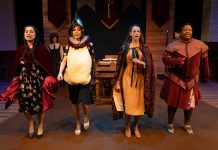If it indeed “takes a village to raise a child,” then volunteer villagers from the Culver City Senior Center recently played a brief but memorable role in the lives of the sixth-graders of Turning Point School, experiencing, in turn, the inspiration and exhilaration children bring to a village.
Welcome to the Third Annual Intergenerational Writing Project, a six-session collaboration between seniors, including myself, and students that commenced in January and ended in March. Meetings included sharing the poems we’d been assigned to write as homework, many very spirited discussions, and introduction of new topics leading to the next assignment.
During our first meeting at the center we were divided into four roughly equal groups. My table consisted of eight bright, funny, aware students (Asher, Avery, Daniel, Hannah, Lia, Maya, Nicole and Rachael), two seniors (Ruth Moats and myself) and teacher Diana Bender.
Per advance instructions, we had written a “where I’m from” poem. Hannah, in describing her home, wrote “I am from the warm feeling when you walk through the door/And the fresh smell of happiness.” Lia’s poem included “I am from looking up at the stars with my dad and promising I would never forget that moment.”
A vigorous discussion of changes we’d like to see followed, including the elimination of third world country status through equal opportunities for all, improved public transportation, more emphasis on music, art and self-expression, and an end to sweatshops. As homework we were to write of our hopes for change.
Jill Thomsen, Volunteer Specialist with the Culver City Parks, Recreation and Community Services Department, then conducted a tour of the center, including the room where the harmonica group was meeting. As they played “Over the Rainbow” the students spontaneously burst into song – a captivating moment.
At our second meeting Asher envisioned “A time when our energy/Comes from never ending, forever giving sources/Like the sun/And the wind/And the water.” Avery wrote of “Smiles on children’s faces/Peace throughout the land/Everyone has a say/No one is discriminated against/Everyone greets you kindly, and listens to you.” And Daniel expressed a hope that resonated with many: “I want no war because war is never the answer.”
We spoke of empathy and the need to see things from alternative viewpoints. As we shared our concepts of friendship, one student said that a friend will always support your actions, “no matter what.” Proving that wisdom is not just the province of the old, another strongly disagreed, hypothesizing that “if you saw your friend playing with a gun, you should be his Spell Check.” Homework was to write an ode about friendship or love.
The third meeting was held at the school and kicked off with a serenade by the students, who had collaborated on an ode about friendship, sung to the melody of Beethoven’s Ode to Joy. We then broke into our groups. Rachael’s poem included these lines: “Who is as great as you?/Humane as you?/Funny as you?/You always leave me wanting more/Of the goodness that comes straight from your core.” We compared school life now to times past, with our assignment being to write about an important learning experience.
During the fourth meeting back at the center, I admired the confidence expressed by Nicole, who wrote “Math, Latin, English/Come try and stop me/’Cause I will tackle any problem you give to me/I am ready for the future/BRING IT ON.”As preparation for our assignment (write a poem from another point of view) we imagined the thoughts of a playground swing.
Innovation was the hallmark of our fifth meeting, as evidenced by Maya’s reflections on a tissue’s perspective: “I started my life as a mighty tree/Now I sit and wait/Will someone please sneeze?”
Since the students would have completed a class trip to Boston and New York prior to our next and final meeting, the assignment was to write a poem influenced by that experience. As our meeting concluded, volunteer Vivian Brown arrived to treat us to a mini-session of Tai Chi, one of many activities offered at the center.
For our final session we returned to the school, where we were shown a clip of a recent student performance of “Oklahoma” as well as slides of the class trip. We then split into our groups to share our poems. The impact of the visit to the 9/11 Memorial was apparent, as well as the excitement of discovering names of family members on the wall at Ellis Island.
Conversation ranged from the future of libraries to a viral video about child soldiers and ended with our personal definition of success, the consensus being that if we could leave the world a better place, we would have succeeded in life. Everyone then headed for the grassy area to form an “alphabet” circle, each coming up with a word to summarize this project, starting with the sequentially appropriate letter of the alphabet. My heartfelt contribution as “Q” was “quintessentially marvelous.” We ended with hugs and many expressions of regret from the students for the brevity of our shared experience.
Afterwards Ruth Moats told me this project had inspired her to start writing her life story for her children, grandchildren and great-grandchildren. “I want them to know that you can accomplish many things no matter what your early circumstances are,” she said.
Jill Thomsen observed that “hearing the different perspectives on a topic is so fascinating, and the students and seniors never fail to surprise me with their insights. All in all, the project always reminds me that as humans we have more in common than we do differences, and that’s always a good reminder!”
I extend thanks to Jill, who initiated this project in 2010; to the students for welcoming me into their world; to Ruth for sharing her childhood recollections about life in occupied territory during WW II; and to teacher Diana Bender for helping us navigate our way to a deeper understanding of each other.













